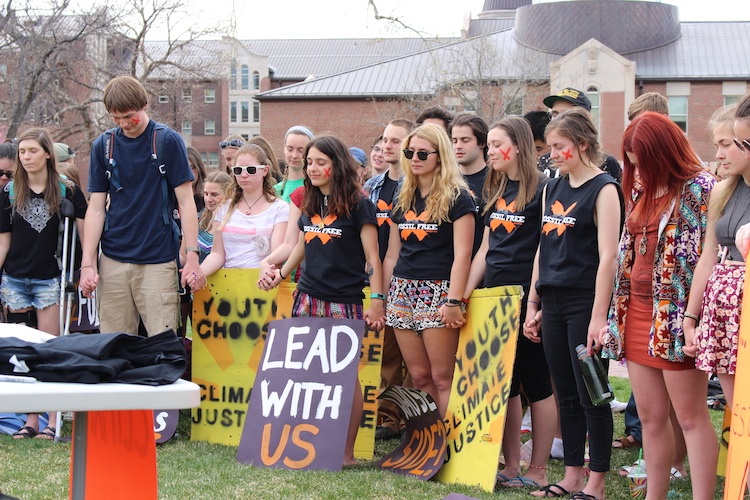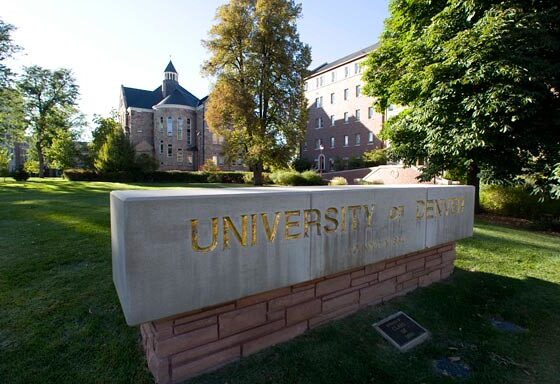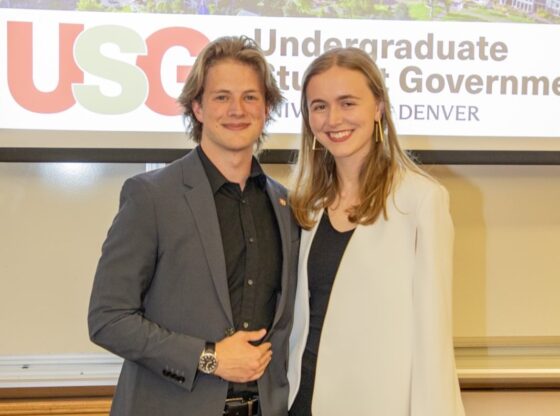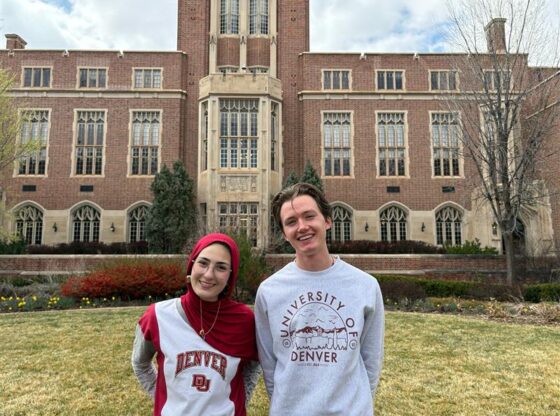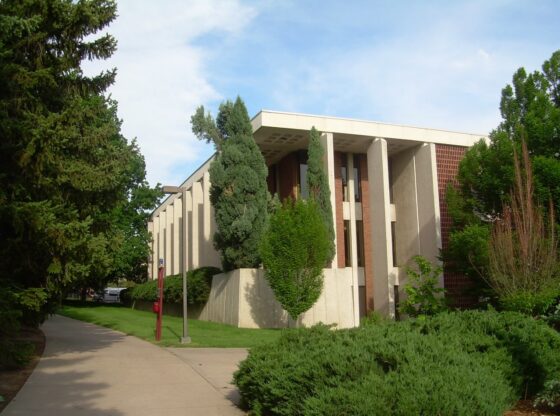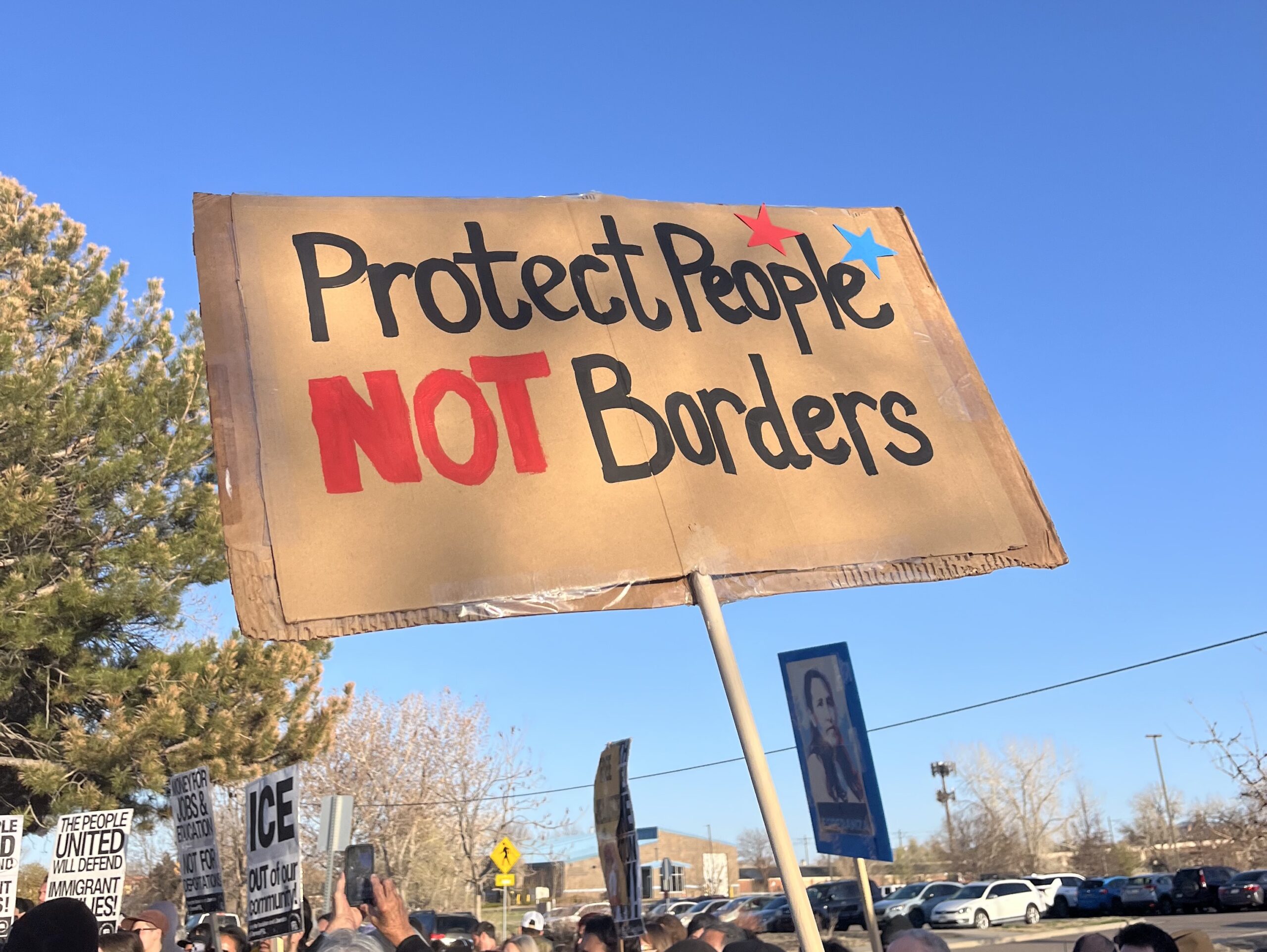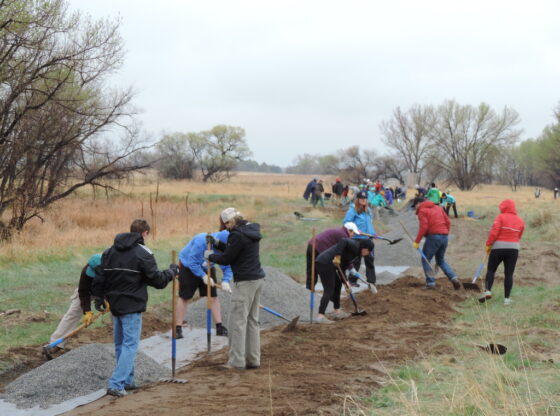On Thursday, April 14 at 2:45 p.m., five leaders of the student organization, Divest DU, presented to the Board of Trustees (BOT) at their biannual meeting in the Anderson Academic Commons (AAC).
Senior Nick Stubler (Grand Junction, Colorado), senior Erin Smith (La Crosse, Wisconsin), junior Lori Scott (Denver), sophomore Kengo Nagaoka (Fairbanks, Alaska) and freshman Maddy Gawler (Denver) addressed the BOT.
Following a rally of upwards of 100 DU students, the BOT listened to Divest DU’s proposal to terminate all financial investments from DU’s endowment in the fossil fuel industry.
The rally, which occurred on Carnegie Green, included poster making, speeches and singing all in preparation for the students to face the BOT.
Walking into the AAC, the students sang a rendition of The Beatles’ “Let it Be”, singing “this is the time for urgency, the future is for you and me, divest from the industry, you and me.”
Greeting the board members, students stood and sang in solidarity with the presenters before sending them into the meeting: promptly leaving once the discussion between the board and the Divest DU leaders began.
Stubler started the discussion following the chair of the BOT, Douglas G. Scrivner’s, introduction.
“We are here today to listen. To understand. To discuss,” said Scrivner.
Stubler thanked the board for their time, then spoke with passion regarding the importance of fossil fuel divestment.
“Today’s presentation is about the urgency of the climate crisis and DU’s moral obligation to take active steps in combating it,” said Stubler.
Stubler also described the present climate trends, stating that 2015 was the warmest year on record, thus explaining to the board that it is crucial for the university to divest sooner than later.
“Our actions or inactions today will affect the lives of humanity for the next millennium,” said Stubler.
Scott followed Stubler’s remarks, speaking of DU’s moral duty to both the local and global community.
“Being a great private university dedicated to the public good, our investment practices that continue institutional oppression are irreconcilable. At DU, we aim to have a culture steeped in ethics and social responsibility. The dissonance between this vision and our investment practices that are directly responsible for perpetuating systemic violence detracts from the authority and integrity of our institution. It is our moral duty as people in positions of economic, political and social power to commit to divestment in June,” said Scott.
Following Scott’s argument, Nagaoka addressed the BOT about the economics and politics of divestment, hoping to answer any questions that surround divestment and the potential impact it could have on the school’s economics.
“Divestment is a strategy for creating an environment where the ultimate solutions for addressing climate change can be enacted,” said Nagaoka. “Universities are moral pillars in our communities. By divesting from fossil fuels, universities send a powerful message that siding with the fossil fuel industry is immoral.”
Progressing through the discussion, Gawler explained to the BOT how Divest DU’s goals should align with the university’s future.
“The peak of fossil fuel investments has passed. The future of investment lies with renewables and socially responsible solutions. Your job as the BOT members is to safeguard and grow our endowment. Every day that you don’t divest is a day of risk,” said Gawler. “With divestment, DU would be the first major university in our region to divest, making us a regional leader. In being a climate leader through divestment, DU will distinguish itself as one of the top-tier institutions in our country.”
Finally, Smith denoted that the university needs to listen to its students and that the BOT must consider the future of DU when considering divestment.
“Divestment is what your current students want and is what your future students need,” said Smith.
Questions from various BOT members followed the conclusion of the student presentation, showing the BOT’s engagement and focus on what the students had stated. Members of the BOT thanked Divest DU for their hard work and insights. The discussion lasted for over an hour.
According to Divest DU’s Facebook page, the chair of the BOT Investment Committee, Kevin C. Gallagher, told the student leaders that the board will not be able to reach a conclusion regarding divestment by the end of the school year. The students asked the board to vote on divestment by May 14.
“Unfortunately, after a very positive Q and A, the meeting ended on a negative note, with Gallagher unequivocally refusing to consider our request for the committee to vote on divestment by May 14,” said Stubler. “We know that it is possible for the committee to vote on divestment by May 14, and are disappointed by Mr. Gallagher’s refusal to do so. The urgency of the climate crisis demands that our board members address the the threat of climate change now; continuing to push the decision down the road violates their moral obligation to current and future students by failing to protect our indefeasible human rights to live on a safe and hospitable planet,” said Stubler.
Divest DU plans to continue taking action in the coming weeks, focusing on urging Gallagher and the overall committee to continue to consider divestment.

